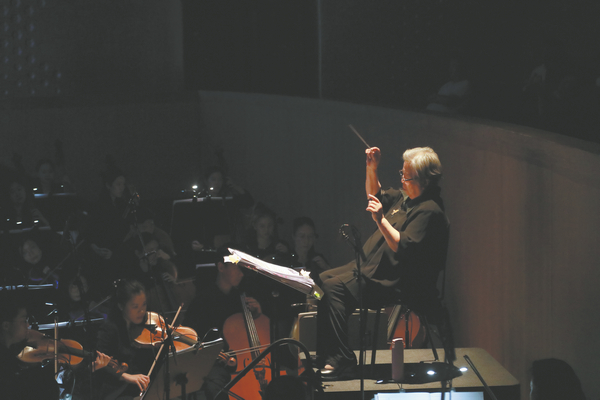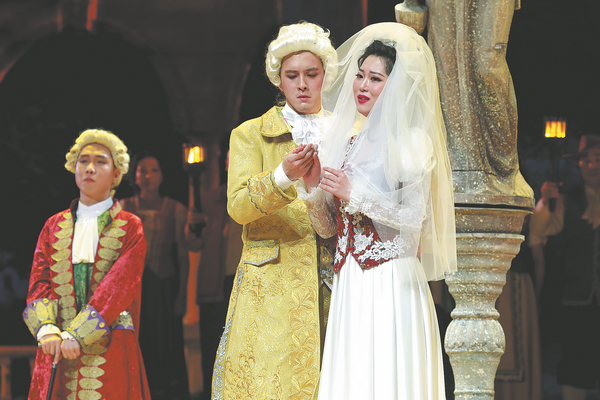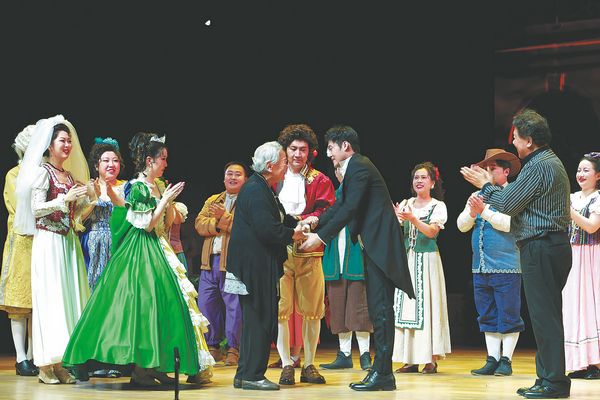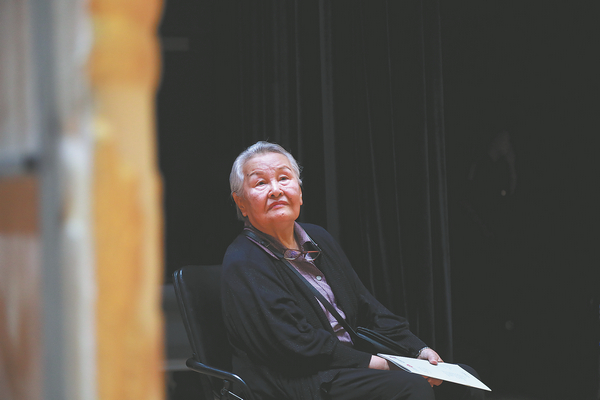The year Western opera got a local touch

Reunion performance 41 years on by the first Central Conservatory of Music graduates demonstrates reach of Chinese-language adaptations, Chen Nan reports.
The year 1977 was key to the development of classical music in China, as it was the first time students could take part in the national college entrance exams and enroll at universities following the "cultural revolution" (1966-76).
The next year, some of today's best-known composers, including Tan Dun, Chen Qigang and Guo Wenjing, became part of the first group of students to major in composition at the Central Conservatory of Music in Beijing.
It was also in 1977 that the prestigious institution launched a five-year program in its opera department, training the first group of opera singers after the Reform and Opening-up began.
On June 17, 41 years after graduating in 1983, the students, now at an average age of 68, returned to the conservatory for Alumni Homecoming Day, a new event. To celebrate, they reprised their graduation performance given in 1983 of a Chinese adaptation of Mozart's comic opera The Marriage of Figaro.
The original performance was conducted by Wu Lingfen and directed by Chen Dalin, who passed away shortly after at the age of 92. It was performed three times at the conservatory and 10 shows were also given to the public, to great success.
"It was the first time that The Marriage of Figaro had been performed in China. We were all very young and excited," recalls the now 80-year-old Wu, a young teacher in the department at the time.
She adds that most of the first intake of students had already been employed before they enrolled.
"They cherished the opportunity to study at the Central Conservatory of Music and worked very hard," Wu says.

Liu Keqing studied to be a baritone in the 1983 class, and was the director of this latest performance, playing the role of Figaro. "We, once youthful students, are now in our 60s and 70s. When we started preparing, we surprised ourselves because we could still remember the lyrics," he says. After graduating, Liu continued his studies in the United States and went on to work in opera houses in Austria and Germany.
"There were 21 of us in the class and with only 11 roles in The Marriage of Figaro, we split into two groups," he says. "To prepare for our graduation performance, the teachers led us through a rigorous rehearsal process, collaborating with directors, orchestra musicians, stage designers, makeup artists and stage managers from the China National Opera House."
"Our five-year training and the graduation performance gave us a clear idea of Western opera, preparing us for careers on the international stage. With the Chinese adaptation of The Marriage of Figaro, Chinese audiences were able to enjoy the performance without the language barrier, which helped make opera popular in the country," says Zhang Yalun, who was also a baritone in the 1983 class and who played the role of Count Almaviva.
The premiere of The Marriage of Figaro planted a seed in members of the audience, among them Zhou Jingbo, who is now a professor at the Communication University of China.
He attended the premiere 41 years ago and recalls that he rode by bike for several hours to watch the adaptation, which he describes as an unforgettable experience.
"Back then, few operas were staged in China and after attending The Marriage of Figaro, I became a fan. I was a young student in 1983 and the performers onstage were also very young. I was intrigued not only by the opera but also by their passion," Zhou says. "They can still sing clearly without amplification today, demonstrating their skills and experience."
Making the latest performance even more special was the fact that the conservatory's current batch of opera students gave their own version of the Chinese adaptation on June 18, not only displaying the skill of today's generation but also the fact that they are keeping the tradition and the efforts of the older generation of opera artists alive.

The two shows were initiated and produced by the Zheng Xiaoying Opera Center, headquartered in Xiamen, Fujian province, which was started by Zheng Xiaoying, the first female conductor following the founding of the People's Republic of China in 1949.
Zheng, 95, gave a lecture in Xiamen for her 90th birthday in 2019, as part of which Zhang Yalun and his wife, soprano Wu Xiaolu, who both performed in the original Chinese adaptation, sang the same arias they had performed in 1983.
Their performance inspired Zheng to organize a revival of the adaptation and the Class of 1983 quickly agreed to reprise their roles for their 40th graduation anniversary last year. However, the event had to be postponed due to COVID-19, so in May this year, the revival was first staged in Xiamen.
"After honing their skills on stages worldwide, their understanding of music has deepened. Their spirit and dedication to their craft are a testament to their commitment," says Zheng, who had an in-depth discussion with alumni performers and the leaders of the Central Conservatory of Music on the afternoon of June 18.

Born and raised in Shanghai, Zheng began to learn the piano at 6, and enrolled to study composition at the Central Conservatory of Music in 1952. In 1960, she pursued further studies in opera, symphony and conducting at the Moscow State Tchaikovsky Conservatory. On Oct 1,1961, she conducted her first concert in Moscow, which she dedicated to the 12th anniversary of the founding of the People's Republic of China. In 1963, she conducted Giacomo Puccini's opera Tosca in the Russian capital, becoming the first Chinese conductor to perform in an international opera house.
Before retirement, Zheng was dean of the conducting department at the Central Conservatory of Music and principal conductor of the China National Opera House.
"Performing (Western) operas in Chinese resonates more with Chinese audiences," says Zheng, who has been promoting Chinese adaptations for years. In 2011, a year after she started the Zheng Xiaoying Opera Center, Zheng adapted Verdi's La Traviata, the first Chinese adaptation to be produced in Xiamen.
"Many young opera singers now have the experience of studying abroad and can speak different languages, such as Italian and German. But for the Chinese audience, language is a barrier to enjoying opera, especially to those who may never have watched a production before," Zheng says. "By producing Chinese adaptations of Western operas, we will have more viewers in the future."
Related articles
-
 'Elvis of China' embodies same roots of cross-Straits cultural ties
'Elvis of China' embodies same roots of cross-Straits cultural tiesMore
-
 Classical Chinese Dance: Ode to Pipa
Classical Chinese Dance: Ode to PipaMore
-
 Cultural Video Series: China - A Demonstration of Traditional Chinese Dance
Cultural Video Series: China - A Demonstration of Traditional Chinese DanceMore
-
 Music scene rocks back to life
Music scene rocks back to lifeMore
-
 Ballet Production Sees the Light
Ballet Production Sees the LightMore
-
 A display of unity where love for dance is vital
A display of unity where love for dance is vitalMore
